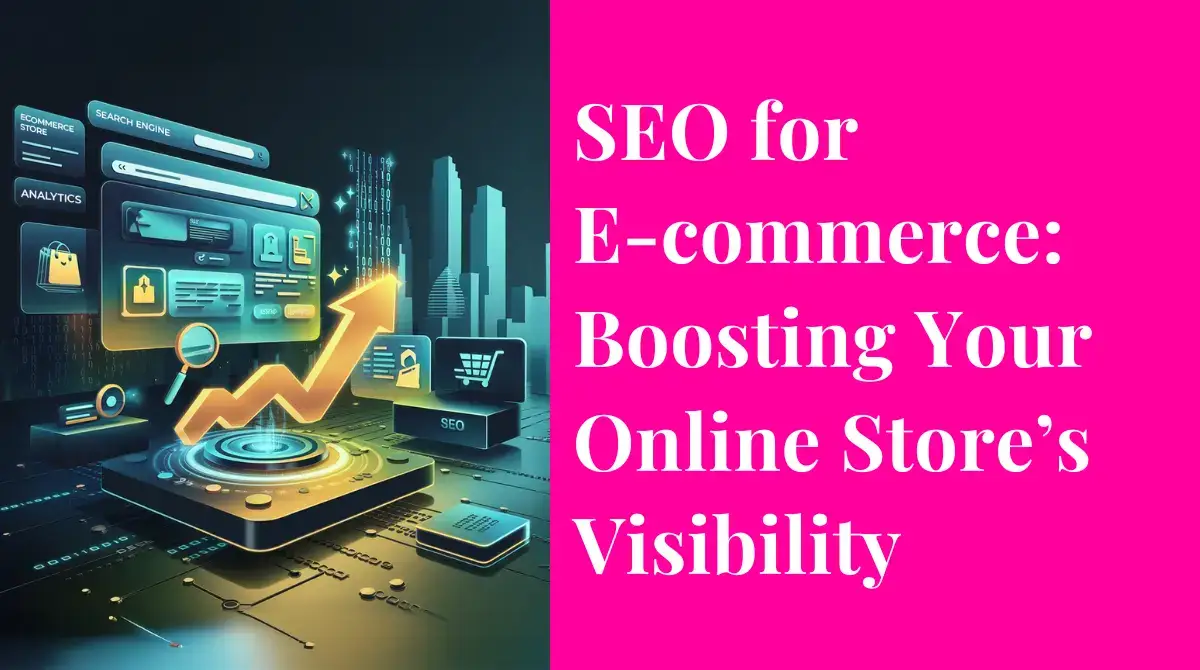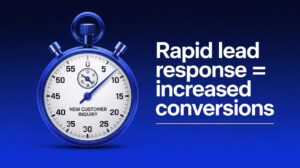If you want your products to reach as many people as possible, a properly optimized e-commerce site is essential. Why so?
This is because the e-commerce business is expected to exceed $8 trillion by 2027. This shows its incredible global growth.
And, if you want to reach this huge audience, optimizing your e-commerce website is really important.
But before that, you must first become visible. And that’s possible if you prioritize SEO services for e-commerce.
Without effective SEO for E-commerce, even the best products may be lost in the vast ocean of online stores. When buyers search for your products, e-commerce SEO ensures your website appears in relevant search results, connecting you with your target audience.
Are you wondering how to implement SEO for your e-commerce websites?
If yes, keep reading this blog, which offers a complete guide to boost your online visibility and drive sales.
Understanding E-commerce SEO
E-commerce SEO is the process of making your online store more visible on search engine results pages (SERPs). To guarantee success, working with an e-commerce SEO company helps in the implementation of customized methods that improve product and category pages. It boosts your website ranking and draws in more relevant visitors.
Differences Between General SEO and E-commerce SEO
Both try to help search engines understand the purpose of a website, but SEO services for e-commerce focus on:
- E-commerce SEO mostly focuses on improving product and category pages.
- E-commerce websites often have a more complex structure because of the vast number of products and categories.
- E-commerce SEO focuses more on content that directly affects sales. However, general SEO focuses on blog posts and informational sites.
Significance of Integrating SEO with Overall Marketing Strategy
The best results from SEO services for e-commerce come from a larger marketing plan:
● Consistency Throughout All Channels
A unified approach to attracting and keeping customers is produced by combining SEO with social media, paid ads, email campaigns, and content marketing.
● Higher Conversion Rates
SEO increases avenues and conversions by attracting visitors who are more likely to become customers.
Keyword Research for E-commerce
Keyword research is important for a successful e-commerce strategy. This ensures that potential users will see your products. Your website won’t appear in search results without it. And this results in missed chances for traffic and sales.
Techniques for Finding Relevant Keywords
Now let’s understand how we can find relevant keywords.
- Select General Keywords
Begin by focusing your research on general keywords associated with your products, such as “shoes” or “electronics.”.
- Use Long-Tail Keywords
Long-tail keywords are less competitive and have a higher conversation rate. So, make use of them in place of short-tail keywords.
- Examine Your Competitors
Use tools like SEMrush, SpyFu, and Ahrefs to find out the keywords your competitors are ranking for. This might help you in finding missed keyword chances.
- Make Use of Keyword Tools
Use tools such as Moz Keyword Explorer, Ubersuggest, and Google Keyword Planner to identify relevant keywords and get information on search traffic and competition levels.
- Analyze Search Intent
Know what the keywords are trying to say. Whether users are trying to learn, compare, or buy products. Customize your approach to the buyer’s journey.
Organizing Keywords by Product Categories and Buyer Intent
After collecting your keyword data, group it according to product categories and classify it by buyer intent, such as informational keywords and transactional keywords. This strategy boosts ranking and delivers content that is suited to your audience’s demands.
On-Page SEO Strategies
On-page SEO is the process of optimizing individual pages on your e-commerce site so that they rank higher and receive more relevant traffic. On-page SEO services for e-commerce sites include product and category pages, as well as general content pages.
Main Elements of On-Page SEO
- Optimizing Product Pages
Write unique product descriptions, optimize photos with ALT tags, and use primary keywords in title tags.
- User-friendly URL Structures
Use keyword-rich URLs to enhance SEO and user experience. Avoid long URLs.
- Schema Markup for Rich Snippets
Rich snippets that display prices and ratings are one way that schema markup increases visibility.
- Internal Linking to Improve Navigation
Link related products to categories for improved user navigation and SEO benefits.
Technical SEO for E-commerce
Technical SEO focuses on optimizing your e-commerce site’s infrastructure to make it easier for search engines to crawl, index, and rank pages. Because of their complex structure and vast number of pages, e-commerce sites need technical SEO.
Important Aspects of Technical SEO
- Website Speed and Performance
Use tools such as Google PageSpeed Insights to guarantee quick load times.
- Mobile Optimization
Use responsive design for flawless mobile experiences.
- Secure Website (HTTPS)
For better search engine rankings and data security, use HTTPS.
- Robots.txt and XML Sitemap
Improve robots.txt and build an XML sitemap for efficient crawling.
- Handling Duplicate Content
Make sure the main page is given priority by using canonical tags to avoid problems caused by product variations.
Off-Page SEO Strategies
What you do outside of your website to improve its ranks is known as off-page SEO. This is how you can implement Off-page SEO services for e-commerce sites.
Building High-Quality Backlinks
Search engines learn about your website’s authority from backlinks. Important tactics:
- Guest Blogging: Write niche articles with links to your website.
- Influencer Collaborations: Collaborate with influencers to get backlinks and reviews.
- Content Marketing: Product reports or infographics that people may share.
- Broken Links and Resource Pages: Replace broken links or submit your content for resource pages.
- Customer Reviews: Promote reviews that link to your website.
Social Media for Brand Visibility
You can improve visibility through:
- Engagement: Share interesting content.
- Influencer Partnerships: Join hands with influencers.
- Campaigns: Run promotions to increase shares.
Engaging with Online Communities
Active participation creates authority:
- Participation: Share tips on Quora and Reddit forums.
- Value-Driven Posts: Provide insightful information.
- Building Trust: Regular interaction makes your brand seem like a resource.
These techniques boost the visibility, rankings, and traffic of e-commerce.
Content Marketing for E-commerce
Content marketing is the next one of the Best SEO services for e-commerce. This SEO service is essential for engaging new customers and generating organic traffic.
Effective Content Marketing Tactics:
- Create Valuable Content: Crafting high-quality content promotes traffic, trust, and user engagement. Guides and blog posts present your brand as an authority while providing helpful information.
- Use Video Content: Product demos and tutorials are examples of video content that increases engagement. Highlights benefits and enhances SEO by keeping users on your site longer.
- User-Generated Content: Reviews and testimonials created by users foster social evidence and trust. This empowers prospective buyers to make wise choices.
Local SEO for E-commerce
Local SEO is very important if your e-commerce business is international, specifically if you have stores or target particular areas. It helps you in drawing clients who are looking for products and services in a certain location.
Two Main strategies for Local SEO:
Optimizing Google My Business Listing
Add correct information to your Google My Business Listing, such as your business hours and NAP (name, address, and phone number). Focus on regional products, such as “Best Camping Gear in Florida.”
Using Local Keywords and Crafting Localized Content
To engage your community, use local keywords like “buy hiking boots in Florida” and generate content that is specific to your area, such as blogs on hiking trials in Florida.
Monitoring and Analyzing SEO Performance
After implementing SEO actions, monitoring SEO data is important to assess the effectiveness of your initiatives and pinpoint areas in need of improvement.
Track organic traffic, keyword rankings, CTR, bounce rates, conversion rates, and backlinks via tools like Google Analytics and Google Search Console.
To ensure ongoing SEO success, regular research of these indicators helps in strategy refinement, content optimization, and site performance enhancement.
SEO is a continuous digital marketing approach for increasing traffic to your e-commerce website. As previously noted, using the right SEO services for e-commerce can increase your site’s visibility. If you lack the necessary skills or would prefer to avoid the problem, then join hands with the Best SEO company for e-commerce and start optimizing your site for success!
Frequently Asked Questions
Why do e-commerce businesses require SEO services?
SEO services help e-commerce businesses rank higher in search results, enhancing visibility, driving organic traffic, and increasing revenues and online presence.
How is e-commerce SEO different from traditional SEO?
Traditional SEO focuses on website presence and content. However, e-commerce SEO optimizes online storefronts for product visibility and conversions.
Which are the best tools for e-commerce SEO?
The best tools for e-commerce SEO are SEMrush, Ubersuggest, Moz Keyword Explorer, Google Trends, Google Search Console, and Google Keyword Planner.
How long does it take for e-commerce SEO services to produce results?
SEO results usually take 3-6 months, depending on the level of competition and the efficacy of the strategy.





